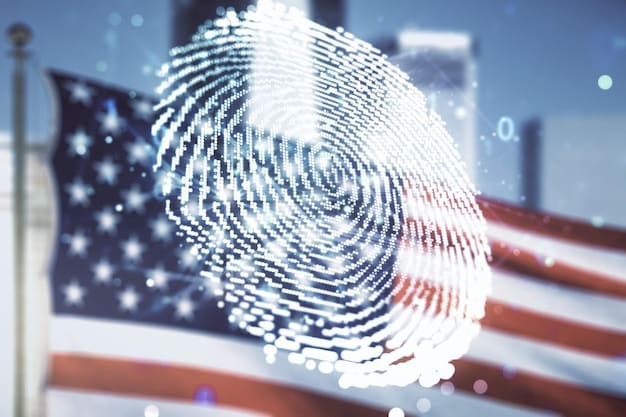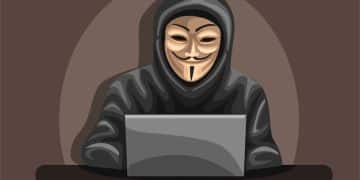Ethical Hacking & US Cybersecurity: Subcultures to the Rescue

Ethical hacking subcultures play a crucial role in bolstering U.S. cybersecurity by identifying vulnerabilities, developing innovative security solutions, and offering alternative perspectives on digital threats that traditional security approaches may overlook.
In an increasingly interconnected world, the United States faces persistent and evolving cybersecurity threats. One of the unsung heroes in this battle is the subculture of ethical hacking.
The Rise of Ethical Hacking in Cybersecurity
Ethical hacking, also known as “white hat” hacking, has emerged as a critical component of modern cybersecurity strategies. Far from being malicious, ethical hackers use their skills to identify vulnerabilities and weaknesses in systems, networks, and applications, with the explicit permission of the owner. This proactive approach helps organizations strengthen their defenses before malicious actors can exploit them.
Defining Ethical Hacking
Ethical hacking involves simulating real-world cyberattacks to uncover security flaws. By thinking like a malicious hacker, ethical hackers can identify potential entry points and vulnerabilities that might otherwise go unnoticed.
The Importance of Proactive Security
Traditional security measures often rely on reactive responses to cyber threats. Ethical hacking offers a proactive approach, allowing organizations to identify and address vulnerabilities before they can be exploited by malicious actors. This proactive stance is essential in today’s rapidly evolving threat landscape.
- Identifying weaknesses in software and hardware.
- Simulating various attack scenarios.
- Providing detailed reports on vulnerabilities and remediation strategies.
- Improving an organization’s overall security posture.
In essence, ethical hacking provides a crucial layer of defense against cyberattacks, enabling organizations to stay one step ahead of potential threats. By embracing ethical hacking principles, companies can significantly reduce their risk and protect their valuable data and assets.

The Subculture of Ethical Hackers
Ethical hacking isn’t just a profession; it’s a subculture characterized by a shared passion for cybersecurity, a commitment to ethical principles, and a strong sense of community. This subculture operates both online and offline, with members constantly sharing knowledge, tools, and techniques to enhance their skills and protect against emerging threats.
Characteristics of the Ethical Hacking Subculture
The ethical hacking subculture is built on a foundation of trust, collaboration, and continuous learning. Members often participate in bug bounty programs, contribute to open-source security projects, and attend cybersecurity conferences to exchange ideas and stay up-to-date with the latest trends.
Online Communities and Forums
Online forums, social media groups, and dedicated cybersecurity communities serve as vital hubs for ethical hackers. These platforms provide a space for members to ask questions, share insights, and collaborate on projects. Some popular online communities include Reddit’s r/netsec, Hack Forums, and security-focused Discord servers.
- Knowledge sharing and collaboration.
- Mentorship and guidance for aspiring hackers.
- Development of open-source security tools.
- Identification and reporting of vulnerabilities in software and hardware.
The ethical hacking subculture plays a critical role in fostering a more secure digital environment. By working together and adhering to ethical principles, these individuals contribute significantly to the defense against cyber threats.
How Ethical Hackers Protect the US
The contributions of ethical hackers extend far beyond the confines of corporate cybersecurity. They play a vital role in protecting the United States from a wide range of digital threats, including espionage, sabotage, and cybercrime. Their expertise and skills are invaluable in safeguarding critical infrastructure, government networks, and sensitive data.
Defending Critical Infrastructure
Ethical hackers work with government agencies and private sector organizations to identify and address vulnerabilities in critical infrastructure systems, such as power grids, water treatment plants, and transportation networks. By simulating attacks and uncovering weaknesses, they help to ensure the resilience of these essential services.
Securing Government Networks
Government networks are prime targets for cyberattacks. Ethical hackers assist in securing these networks by conducting penetration tests, identifying vulnerabilities, and developing strategies to mitigate risks. They also help to train government employees in cybersecurity best practices.
- Protecting sensitive data from theft and espionage.
- Preventing disruptions to essential services.
- Enhancing the security posture of government agencies.
- Responding to and recovering from cyberattacks.
Ethical hackers play a crucial role in protecting the United States from cyber threats, ensuring the security and stability of the nation’s digital infrastructure.
The Legal and Ethical Considerations
While ethical hacking is a valuable tool for enhancing cybersecurity, it’s essential to operate within legal and ethical boundaries. Unauthorized access to computer systems is a crime, and ethical hackers must obtain explicit permission before conducting any security assessments. Adhering to ethical principles and legal regulations is paramount to maintaining trust and credibility.
The Importance of Consent
Ethical hackers must always obtain explicit consent from the owner of a system before conducting any security assessments. This consent should be documented in writing and should clearly define the scope of the assessment.
Ethical Hacking Certifications
Several organizations offer certifications in ethical hacking, such as the Certified Ethical Hacker (CEH) certification from EC-Council. These certifications demonstrate that an individual has the knowledge and skills required to conduct ethical hacking activities in a responsible and professional manner.
- Respecting privacy and confidentiality.
- Avoiding harm to systems and data.
- Disclosing vulnerabilities responsibly.
- Adhering to legal regulations and ethical guidelines.
By adhering to legal and ethical guidelines, ethical hackers can ensure that their work is both effective and responsible, contributing to a more secure digital environment for all.

The Future of Ethical Hacking and Cybersecurity
As technology continues to evolve and cyber threats become more sophisticated, the role of ethical hacking in cybersecurity will only become more critical. Emerging technologies, such as artificial intelligence (AI) and machine learning (ML), are creating new opportunities for both attackers and defenders. Ethical hackers will need to adapt and develop new skills to stay ahead of the curve.
The Role of AI and Machine Learning
AI and ML can be used to automate many aspects of cybersecurity, such as threat detection and vulnerability analysis. However, they can also be used by attackers to create more sophisticated and evasive malware.
The Importance of Continuous Learning
The cybersecurity landscape is constantly changing, and ethical hackers must commit to continuous learning to stay up-to-date with the latest threats and technologies. This includes attending conferences, participating in training programs, and engaging with the cybersecurity community.
- Developing expertise in emerging technologies.
- Staying informed about the latest threats and vulnerabilities.
- Collaborating with other cybersecurity professionals.
- Promoting ethical hacking practices within organizations.
The future of cybersecurity depends on the ability of ethical hackers to adapt, innovate, and collaborate. By embracing these principles, they can continue to play a vital role in protecting the United States from digital threats.
Subcultures and Their Impact on Innovation
Subcultures frequently challenge prevailing norms and conventional wisdom, leading to groundbreaking innovations in various fields, including cybersecurity. The unique perspectives and unconventional thinking fostered within these groups allow for creative problem-solving and the development of novel approaches to complex challenges.
Challenging Conventional Wisdom
Subcultures often operate outside the mainstream, enabling them to question established practices and explore alternative solutions. This willingness to challenge conventional wisdom can lead to breakthroughs that would not be possible within more traditional settings.
Fostering Creativity and Experimentation
The freedom and autonomy that characterize subcultures encourage creativity and experimentation. Members are often more willing to take risks and explore unconventional ideas, leading to the development of innovative products, services, and technologies.
- Out-of-the-box thinking and problem-solving.
- Rapid prototyping and experimentation.
- Open-source development and collaboration.
- Grassroots innovation and entrepreneurship.
The impact of subcultures on innovation extends beyond cybersecurity, influencing fields such as art, music, fashion, and technology. By fostering creativity, challenging norms, and promoting collaboration, subcultures play a vital role in driving progress and shaping the future.
| Key Concept | Brief Description |
|---|---|
| 🛡️ Ethical Hacking | Proactively identifying vulnerabilities to prevent cyberattacks. |
| 🧑💻 Subculture Impact | Subcultures foster unique problem-solving in cybersecurity. |
| 🇺🇸 US Protection | Securing critical infrastructure and government networks. |
| ⚖️ Legal & Ethical | Adhering to laws and ethical guidelines is crucial. |
Frequently Asked Questions
▼
Ethical hacking involves legally and ethically testing systems for vulnerabilities. It’s like a security check-up, where experts try to find weaknesses before malicious hackers do, aiming to strengthen defenses.
▼
They protect infrastructure and government networks, enhancing security and preventing data theft. Their expertise is crucial for maintaining the US’s digital safety. They are the first line of defense for digital assets.
▼
It’s a community driven by passion, collaboration, and continuous learning. Ethical hackers share knowledge and tools, improving security solutions collectively to stay ahead of criminal hackers.
▼
Yes, all activities must be legal, requiring explicit permission from system owners. Ethical conduct is vital for ensuring trust and credibility. Consent is the cornerstone of ethical hacking practices.
▼
It revolves around evolving with tech, especially AI, necessitating ongoing skill updates. Adaptation and innovation will be key in countering advanced cyber threats. Continuous learning is non-negotiable for their success.
Conclusion
In conclusion, ethical hacking subcultures are essential protectors of the U.S. against evolving digital threats. By challenging norms, innovating, and collaborating, they strengthen cybersecurity and safeguard critical infrastructure, government networks, and personal data. Their legal and ethical work ensures a more secure digital future.





